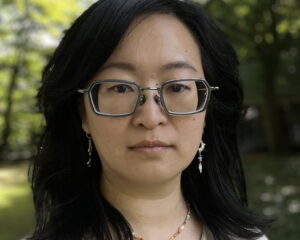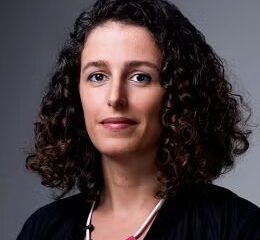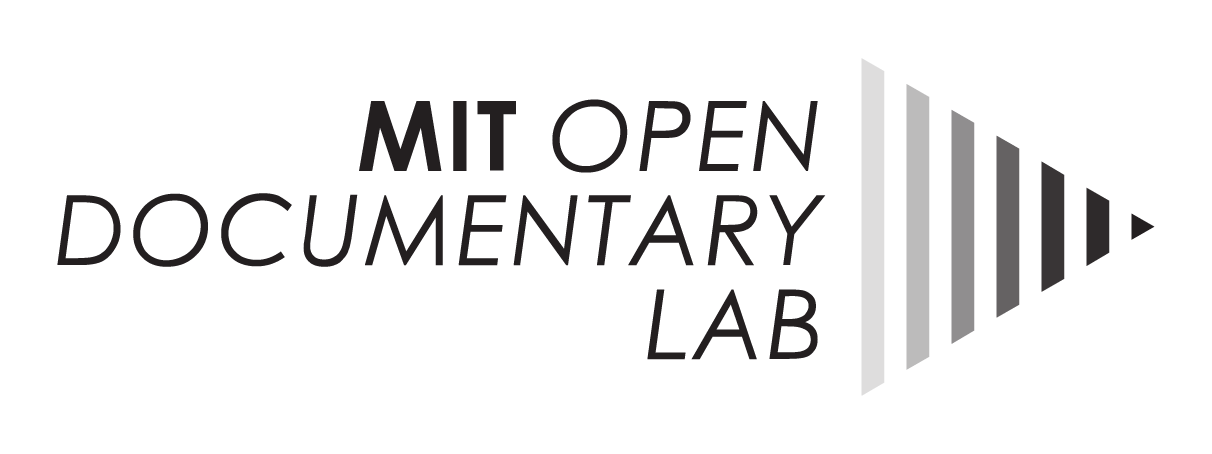06 Sep Introducing New MIT OpenDocLab 2025-2026 Fellows
The MIT Open Documentary Lab welcomes five new fellows this semester.
 May Abdalla, an Onassis ONX Fellow, is a twice Emmy-nominated director and artist recognized for her groundbreaking work that merges physical experience, technology, and storytelling. Her projects offer poetic insight, tackling contemporary issues through a mixture of documentary, game-design and speculative fiction. She co-founded the award-winning studio Anagram in the UK in 2013 to experiment with modes of user interactivity in non-fiction storytelling. Anagram’s Playing With Reality has received two Venice Lions the Grand Jury Award for Best VR and the Immersive Achievement Award in 2024. At MIT Open Doc Lab, she will be working on Amorphous, a transformative multiplayer experience that redefines how we inhabit our bodies. inhabit our bodies.
May Abdalla, an Onassis ONX Fellow, is a twice Emmy-nominated director and artist recognized for her groundbreaking work that merges physical experience, technology, and storytelling. Her projects offer poetic insight, tackling contemporary issues through a mixture of documentary, game-design and speculative fiction. She co-founded the award-winning studio Anagram in the UK in 2013 to experiment with modes of user interactivity in non-fiction storytelling. Anagram’s Playing With Reality has received two Venice Lions the Grand Jury Award for Best VR and the Immersive Achievement Award in 2024. At MIT Open Doc Lab, she will be working on Amorphous, a transformative multiplayer experience that redefines how we inhabit our bodies. inhabit our bodies.

Asha Easton, a Royal Shakespeare Company Fellow, is a lead on Innovate UK’s Immersive Tech Network, helping guide organisations in the XR sector looking for funding for developing innovative products related to XR. She shares insights into the market and uses her network to help organisations create powerful connections. She supports organisations involved in Virtual Reality, Augmented Reality, Mixed Reality, Film/TV, Production & post-production, VFX & Animation, Gaming, 5G, Hardware and Wearables. She is passionate about helping to promote diversity & inclusion in the XR space and is a co-founder of the XR Diversity Initiative, involved in working groups for XRAccess, and a member of Women in Immersive Tech.
 Navid Khonsari, an MIT Co-Creation Studio Fellow, is a co-founder of iNK Stories. Khonsari helped shape the cinematic style of Grand Theft Auto, Max Payne, and Resident Evil, and has pioneered award-winning titles like 1979 Revolution: Black Friday and HERO. His latest project, Lili—a hybrid screenlife video game + live-action film now in production—uses AI on multiple fronts to push the boundaries of interactive storytelling. After premiering at Cannes as the first video game in competition, Lili continues to redefine how technology, cinema, and games collide. His research investigates how artificial intelligence can be reimagined as a collaborator and co-author in storytelling, shifting the boundaries of authorship, agency, and ethics in narrative creation.
Navid Khonsari, an MIT Co-Creation Studio Fellow, is a co-founder of iNK Stories. Khonsari helped shape the cinematic style of Grand Theft Auto, Max Payne, and Resident Evil, and has pioneered award-winning titles like 1979 Revolution: Black Friday and HERO. His latest project, Lili—a hybrid screenlife video game + live-action film now in production—uses AI on multiple fronts to push the boundaries of interactive storytelling. After premiering at Cannes as the first video game in competition, Lili continues to redefine how technology, cinema, and games collide. His research investigates how artificial intelligence can be reimagined as a collaborator and co-author in storytelling, shifting the boundaries of authorship, agency, and ethics in narrative creation.
 Pei-Ying Lin, a Royal Shakespeare Company Fellow, is an is an artist/designer from Taiwan and is currently based in Eindhoven, the Netherlands. She holds a MA in Design Interactions from the Royal College of Art, UK and a BSc in Life Science from National Tsing Hua University, Taiwan. She will be investigating how we perceive and classify AI, as well as observing how researchers attune their bodies and senses to protocols, and how they interpret invisible entities (like microorganisms) through indirect observation. She is a PhD Candidate in the department of Industrial Engineering and Innovation Science and the Department of Industrial Design at the Eindhoven University of Technology.
Pei-Ying Lin, a Royal Shakespeare Company Fellow, is an is an artist/designer from Taiwan and is currently based in Eindhoven, the Netherlands. She holds a MA in Design Interactions from the Royal College of Art, UK and a BSc in Life Science from National Tsing Hua University, Taiwan. She will be investigating how we perceive and classify AI, as well as observing how researchers attune their bodies and senses to protocols, and how they interpret invisible entities (like microorganisms) through indirect observation. She is a PhD Candidate in the department of Industrial Engineering and Innovation Science and the Department of Industrial Design at the Eindhoven University of Technology.
 Neda Moridpour (she/they), a Royal Shakespeare Company Fellow, is a Kurdish-Iranian cultural futurist, artist, and organizer whose research examines cycles of violence that lead to displacement, discrimination, and systemic inequities. Through socially engaged art and community-based participatory research, they create collaborative spaces grounded in mutual care, community building, and the visualization of future world-building. Moridpour is a Professor of the Practice at the SMFA and Tisch College at Tufts University and a Co-Creation Studio Fellow at the MIT Open Documentary Lab. Their fellowship will focus on an interactive and multi-platform art project, initiated by Hamdel Futurist Collaborative, which reimagins the archive not as a static repository, but as a living, participatory space of collective care, solidarity, and shared memory.
Neda Moridpour (she/they), a Royal Shakespeare Company Fellow, is a Kurdish-Iranian cultural futurist, artist, and organizer whose research examines cycles of violence that lead to displacement, discrimination, and systemic inequities. Through socially engaged art and community-based participatory research, they create collaborative spaces grounded in mutual care, community building, and the visualization of future world-building. Moridpour is a Professor of the Practice at the SMFA and Tisch College at Tufts University and a Co-Creation Studio Fellow at the MIT Open Documentary Lab. Their fellowship will focus on an interactive and multi-platform art project, initiated by Hamdel Futurist Collaborative, which reimagins the archive not as a static repository, but as a living, participatory space of collective care, solidarity, and shared memory.
They join our cohort of returning fellows all of whom you can see here.



